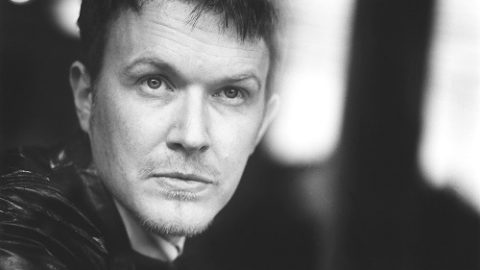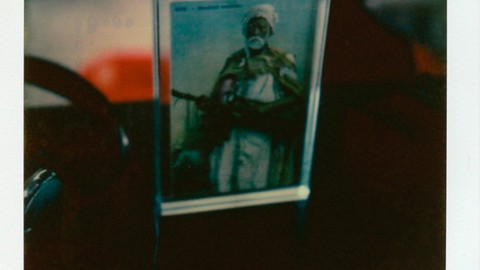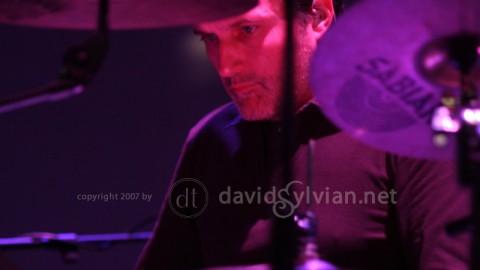
Alone in the middle of a forest in New England, David Sylvian embraced disillusionment, rejected false gods and embarked on a more austere songwriting regimen than ever before. For his latest studio album, Manafon, the former pop singer also made connections with electroacoustic improvisors including Keith Rowe, Evan Parker, John Tilbury, Polwechsel, Otomo Yoshihide and Toshimaru Nakamura.
By Biba Kopf. Photography by Donald Milne
If you had asked me prior to my leaving Virgin, did I find being with Virgin restrictive in any way, did I find that it coloured the kind of work that I was attempting to put together?, Id have said, No, Ive got a complete free hand here. But, confesses David Sylvian, in a West London hotel room during a rare, brief visit from his home in New England, having left Virgin, I think there maybe was self-censorship involved, knowing that you could only go so far with a major label. For the last few years of my time there, theyd welcome the work, but then kind of buried it, knowing that it was no longer of interest, no longer an earner for them. Prior to that I felt that there was a commitment on their part and theyd given me an enormous amount of freedom. So where was the restriction? I couldnt really see it until I started working on Blemish. And as I was working on it I realised I would never have undertaken something like this while I was signed with a major label. So there had to be self-censorship at work, loath as I am to admit to it.
Launching his SamadhiSound label with Blemish in 2003, Sylvian left the comfort zone of 20 years of Virgin patronage for the ground zero territories of Improv. Gone were the starry cast of rootless cosmopolitan international experimental jetset collaborators Bill Frisell, Ryuichi Sakamoto, Marc Ribot, Talvin Singh with whom he had turned the songs of his final Virgin album Dead Bees On A Cake into an affectless, cloying melancholy with the consistency of molasses. In their place, on Blemish, Sylvian cast his baritone over eddying pools of computer-tooled electronic reverb and glitch; but much more surprising were the songs he constructed around three abstract, ungiving guitar improvisations from Derek Bailey. Six years later, the release of its sequel, Manafon, confirms that the Bailey collaboration was no dilettantish one-off. For Manafon, Sylvian put together three basic units from some of the worlds most fiercely puritanical improvisors: guitarist Keith Rowe and his ex-AMM partner, pianist John Tilbury, with guitarist Burkhard Stangl, bassist Werner Dafeldecker and cellist Michael Moser of Viennese Reductionists Polwechsel; trumpeter Franz Hautzinger; Evan Parkers Electro-Acoustic Ensemble; and onkyo musicians Otomo Yoshihide on guitar and turntables, Sachiko M on sinewave sampler, Toshimaru Nakamura on no-input mixer and Tetuzi Akiyama on guitar. The fixer was Christian Fennesz, with whom he had struck up a working relationship after exchanging a track apiece on Fenneszs Venice and Sylvians Blemish.
Christians a very generous person, remarks Sylvian, a very generous musician. He opened the door to that world for me and encouraged me to come in and give it a try. Polwechsel he had worked with before, and with Keith Rowe he had a very good relationship. So it was great to have him there as a friend, someone who could encourage me to take that step. I was at the end of touring Blemish in Cologne, which coincided with [the Erstwhile labels] Jon Abbey touring one of his concerts in Cologne, which Christian was a part of, and he said, Why dont you come along? I met nearly everyone involved with Manafon there and then the onkyo guys, Keith Rowe with the exception of Evan Parker and John Tilbury. I dont ever allow budgets to stand in the way of the selection of musicians, he continues. I mean, whats happened since the collapse of the major label is that you have a global collection of musicians that interact with one another without contractual obligations to either management or labels or very limited ones. So I dont have to go through Evan Parkers manager to talk to Evan, and thats very liberating. And it started even before Id left Virgin with Robert [Fripp], when we started writing together. He liked to work on the bartering system, you know, Ill do this for nothing if you work for me when I need you kind of approach. And basically thats how things stand now with a lot of musicians. Thats very liberating. Weve done away with that whole mechanism of the industry which controlled the talent. Now were free to engage with each other with no restrictions. Some people want and need to be paid, but there are other relationships that you can see are going to be more longstanding and so you approach those slightly differently.
The Manafon sessions began in 2004 in Vienna with Fennesz, Polwechsel and Keith Rowe, continued in Tokyo with the onkyo contributors and concluded in London with members of Evan Parkers Electro-Acoustic Ensemble and John Tilbury. At the beginning, in Vienna, I knew what I was looking for but didnt know how to go about finding it, says Sylvian. With free Improv players you can only put so many parameters in place, you basically want to give them free rein. So, everything really comes down to the careful selection of the players youre going to work with, because to have that background knowledge of what it is they do, and how they will respond to one another, is half the work really. So I was kind of looking for this modern chamber ensemble if you like, for want of a better term. People who were familiar with each other, but I could bring elements in, players in, that werent part of the original set-up.
And what are you going to do? was the the question Id often get asked as I walked into the room, he smiles. Nothing, was my answer. Im going to do nothing. I wanted to intervene as little as possible. The whole point for me is to bring my voice into that context. And I cannot sing like that on the spur of the moment, at least I havent been able to come up with a means where that would appear to be possible.
Art song out of Improv is not unprecedented, even among the musicians Sylvian gathered for Manafon. Otomo has made various song albums, most notably Dreams with his New Jazz Ensemble featuring the vocalists Phew and Jun Togawa. In the 1980s, Evan Parker moonlighted on Scott Walker and Vic Reeves recording sessions. Possibly closest, however, to the Reductionist spirit of Sylvians project is Christof Kurzmann and Burkhard Stangls Neuschnee, and Kurzmanns cabaret group The Magic ID; except that, as a tentative vocalist, Kurzmanns commitment to song is undermined by a selfconscious approach that wraps his sung words in quotation marks. But for Sylvian, the voice has always been the singular, unwavering scalpel of his introspection, cutting to the heart of songs so open and honest in their documentation of the writers growth over three decades that anyone less selfconscious than Sylvian wouldnt be able to sing them for blushing. What distinguishes Sylvians approach to his material is his pop grasp of the mechanics of songwriting, even as he presently chooses to rip up the manuals.
The restrictions of writing for voice have more to do with restriction of the form than anything else, he says. As a pop musician you use the form as an impetus, as a drive, as in, What can we do with this? How can we adapt this? How can we break this down? It becomes part of the challenge of working as a songwriter. But in different contexts it is the obstacle that one has to almost want to throw out of the window and start from scratch. And it was that desire which drove me to find means of writing based on improvisation with Blemish. I thought if you had something thats openended, you can do away with the idea of form altogether, because you can rebuild it how you choose. It doesnt need to have any kind of traditional framework at all. So I suppose that was it, the writing of the actual track Blemish was it it was like, OK, this works. And it suggests a greater complexity than that traditional song format. It allows you to bring in so many influences that youve absorbed over the years, consciously or otherwise, into the work. Im constantly surprised by the amount of liberty its given me, which I wouldnt have found in any other context. Sylvians interest in improvisation long predates Blemish and Manafon. While he was still signed to Virgin, he went out on tour with Robert Fripp in 1993 (as documented on Damage). Earlier, in the late 1980s, he recorded a couple of albums of meandering instrumental drone compositions with Holger Czukay (Flux + Mutability, Plight & Premonition); and in between, in 1991 he reformed Japan for a one-off reunion as Rain Tree Crow on the proviso that they jam the songs into being in the studio, with mixed results. Rain Tree Crow for sure had elements of Improv, recalls Sylvian, as did pieces like Steel Cathedrals way back in the mid-1980s. But with Rain Tree Crow, though there was a fair amount of Improv involved in the initial recording of the tracks, we tended to sculpt the work over time and fairly often we were replacing the Improv elements, you know. Coming from a pop background as we did, there was always the temptation to polish, to think, We can make that better. Because we were not improvisors. I dont think we really took away from the performance element which youd find on Manafon, for example. If I drafted a sax player in to replace Evans parts and to really get them polished, to replace this note with that, obviously youd have lost something beautiful and integral and profound in the work. Working with Rain Tree Crow, it wasnt like that. We were working towards compositions, it was just very useful that they came out of improvisational sessions, jam sessions.
Elsewhere Sylvian has worked with jazz pianist John Taylor, who brought a peculiar lurching gait to the hopefully titled single, Pop Song, included on the thoughtfully compiled double CD retrospective Everything And Nothing, which pretty much signed off his Virgin deal in 2001. The same collection includes a tantalisingly brief extract of his first serious venture into heavy Improv, featuring pianist Keith Tippett, percussionist Mark Sanders and himself on guitar and voice, recorded in 1991, and called Thoroughly Lost To Logic. Its just a coda of a piece, says Sylvian. At that time I decided, Im going to give this a try, and just do a day of Improv, with rough guidelines in place, and see if I could find a footing in this context. It seemed so far removed from where I was at that time, but even back then there was something that drew me into this abstraction, if you will, and to try and find my voice in this context. It seems absurd, looking back, that I had the wherewithal to do that. Because Im not an improvisor, I certainly wasnt back then, I didnt even have the process I have now, so how I was going to tackle it I didnt know. But the desire was there, to throw myself in at the deep end. To feel completely out of my depth, and to see if I would sink or swim. Keith did a fantastic job, but in the end I found with that material that it was just too dense for me to work with melodically. Far too complex. So I had to wait till the late 90s for free Improv to have maybe evolved to the place its got to with all this space, where it allowed me to see where a voice might sit in this context.
As already stated, Sylvian songs are the sound of a melancholy mindset, their lines invariably unfurling at the sluggish tempo of a dark muddy river. That river springs from the writers solitude. Since breaking up with his wife Ingrid Chavez in 2005, he has lived alone in a forest in New England, where his only regular visitors are his two daughters. I lead a very isolated existence and I spend 90 per cent of my days alone, he says. It took me a while to acclimatise to that way of life and its quite difficult to reacclimatise to interaction with other people, let alone performing to an audience. Sometimes its in a solitude that feels profound and comforting and desirable, and other times its isolating and completely lonely. But Ive always thought that to produce something fresh or new or of value you have to withdraw yourself from the common influences of society, and so I felt that withdrawing myself in this way might enable me to do away with any kind of conscious or subconscious influences that society might have on me by living in cities, soaking in media. The further I get away from that, the more I feel that this is my true voice. Theres only so much permeating the work from the outside. Of course, I cant take into account what other people bring into the work. But in terms of my perception of it, it has a clarity to it or an integrity that it might not have if I lived under any other kind of circumstances. Im not saying I can continue to live this way or wish to live in this way, or it may just be the way I continue to live for the rest of my days or whatever, but this work was born out of that environment, it was born out of isolation.
If this is Sylvians equivalent of a Walden-like retreat, its not without its creature comforts, among them an internet connection. Well, I dont think I could live in complete isolation as I would if I didnt have an internet connection, which opened up the whole world to me, he laughs. Now that I think of it, we create our own culture around us whats not necessarily on the doorstep you keep in touch with via the web. And we all are very selective with what we take on board because theres just too much information, too much out there and I guess, I assume, that in isolation you can be even more selective in terms of what you let into your life, what you allow to become an obsession, or an interest or a source of information, or an inspiration.
Sylvian rarely breaks mood or pace from album to album, from song to song, and the same holds true for Manafon, despite the challenges the improvised base materials posed him as singer and songwriter. The slow brood of his voice glowers above the Reductionist impulses of his select ensembles, the introspective intensities of their guided improvisations offering up to him oblique prompts, both as singer and lyricist. Often the music feels like little more than sonically primed canvas, the odd spillage and occasional expressionist daub notwithstanding. The melancholy nature of Sylvians solitary muse might run contrary to the collective endeavour of Improv, but that doesnt mean hes too dysfunctional to communicate what hes looking for from his ensemble musicians in a way that doesnt inhibit the improvisations free flow. Selfishly you could say I was looking for that space within which to work as a vocalist. But there has been this paring down going on in my work for years, but which is highlighted on something like Blemish. Suddenly I managed to find a form, or forms, that worked for me in that respect. That didnt need embellishment. There was a strength in the discretion of the work if you like. I think that the whole process of writing the material changed radically from the way Id written in the past, basing it around improvisation as I did. So Manafon kind of grows out of the processes that were discovered personally for me on Blemish. And it immediately suggested where I should go with Manafon. Not necessarily musically, but in sense of the process of creating the work. It was all there, inherent in the pieces, particularly in the pieces that I worked on with Derek Bailey. So it was a matter of expanding the ensemble and seeing how, if it could still hold together, I could still find a footing within that framework.
Also, he continues, working with Derek Bailey had kind of set up the modus operandi for how this was going to work for me. To allow free improvisation in the sessions and then to take that material away and not to listen to it again, not to approach it again until I was ready to start the writing process. So there was an immediacy also to the writing process; as I was listening I was jotting down the lyrics for the piece, and within a matter of hours there was a full set of lyrics, and then I immediately performed that. So there was an improvisational process for me too, though not in the purest sense. Thats how I tried to keep the whole process as fresh as I possibly can. Theres a kind of Ginsberg idea which comes from Buddhist teachings: first thought, best thought right thought. So its that kind of idea: not too much revision in the process of writing, just follow it through and wherever it takes you, wherever it leads, however revealing it might be, or what it is revealing, youre probably not aware of at the time but you just kind of go through it, find the melody for it, within that framework. Its a very intuitive process, I cant say that its an intellectual process.
The more I work on a piece, the further it seems to get from the original improvisational nature, the mood, spirit and atmosphere of the original improvisation, he cautions. I mean, I could have cut into it. I could have really gone to town on editing the work but I didnt, I left the original performances more or less intact, to keep that spirit, that continuity if you like, alive. I didnt want to cut into it too much. Individual performances within that duration, within that timeframe sure, there were edits made. But generally the overall arc of the work is as is performed on the day.
Heres where outsiders like myself wonder whether there was some conflict between the musicians who created the improvisations and Sylvians treatment of them as raw material to be edited and shaped by him later. There was just an enormous generosity on the part of everybody involved, he insists. I certainly made it clear to those that asked that I might not keep the integrity of the work intact. I might cut into it, I cant promise that I wouldnt. But no, there was no hesitation on the part of any of the musicians to get involved, and to see it as an interesting experiment. Which was gratifying, to say the least. There was no, Well, play with that for a while and play us the results before we give our OK on it. They completely signed off on the work when it left the studio.
The changes rung on Manafon are not only down to its electroacoustic Improv orientation. The disc also marks a shift to third-person and more obviously fictional narratives, which prove to be paradoxically far more revealing, autobiographically speaking. Undertones of violence ripple through a number of tracks: the first, most significant occurrence coming on the disillusioned opener Small Metal Gods, which is a barely veiled allusion to Sylvians break with the gurus who have played such a large role in his art and life these past 20 years. Picking out the layered and intercut improvisations of Polwechsel, Fennesz, Nakamura and Otomo, Sylvian sings: Ive placed the gods/In a zip-loc bag/Ive put them in a drawer/Theyve refused my prayers/For the umpteenth time/So Im evening up the score. The concluding verse goes: Small metal gods/Cheap souvenirs/Youve abandoned me for sure/Im dumping you, my childish things/Im evening up the score.
That vein of disillusion transforms into something like wintry social realism in The Rabbit Skinner (now theres a title youd never expect to see on a Sylvian album), with its more obviously autobiographical opening line Wholl do for him/Child of the 50s (to Evan Parkers Electro-Acoustic Ensemble augmented by John Tilbury).
Theres a sense of liberation in expressing this disillusion, whether its true or not, reveals Sylvian. Its the freedom to doubt. I think its in the Tibetan Buddhist religion where they have these gatherings, I think even on a daily basis, where they dispute the teachings of the Buddha. They argue against him. That is extremely healthy for any community, for any democracy. Let alone a religious group. So in a sense that was me taking a look at an approach Id taken to life and disputing it. And then really feeling it, true to heart. I still havent resolved that issue myself, but it felt liberating just to be able to express it. You know, you can wipe that page clean if you choose. Theres a whole life of experience thats led you to that point, and theres a breaking down of personal psychological barriers. Because we colour everything we do with our own psychology, with our own minds. And so no matter what we do, reality is always subjective. But its going, How far can we recognise those patterns of our own minds that tend to be our own undoing, to reach a point where we can see beyond that?
I feel I’m free to question everything, he continues, but that doesnt mean I cant also allow myself the indulgence of trying everything, and maybe repeatedly, with a different outlook or a fresh approach. And as I say, Ive reached a point at the moment where none of the questions has been resolved for me. I dont expect them to be in this lifetime. Its a matter of finding a point of finding some solid ground on which to stand. I think I found that way back, in 1982, 83, and that still remains true to a certain extent, but there has to be a change to the foundations somewhere. Theres something not quite right about it. And its something within me, within my psychology, which isnt adapting its either putting up some kind of resistance, or theres something wrong with the system. No doubt that its all down to me, my own psychological resistance to certain givens.
More than the lyrics themselves, the albums true pleasure comes in the way Sylvians vocal lines respond to the gravitational tugs and disorientations of the improvisations, abruptly curving into a space, modulating volume shifts and, most gorgeously, in the final few lines of the ironically titled 11 minute track The Greatest Living Englishman, where he briefly breaks scansion to light up, torchlike, the depth of the songs sense of disillusion: Little England, you fit like a straitjacket/Hemmed by the genius of others/He said, To conquer the world is not to leave a trace/Remove even the shadow of the memory of your face/A grey of no significance. (All this over the misfiring duetting guitars of Otomo and Akiyama, alongside the accidental erasures of Nakamura and Sachiko M, and tender punctuations of John Tilbury.) But, the way he talks and writes about it, Sylvian is perhaps proudest of Manafons title track, named for the village where Welsh poet RS Thomas lived, and whose preacherly struggles with his faith, family and fellow man he sees as somehow key to the album.
People didnt warm to him, explains Sylvian. He was an austere man, quite frightening in his old age I think. People were intimidated by him. But the way he writes about the working man, the life of the working man and the austerity of the life of the working man, is how he touches on a humanity that he cant himself connect with. He didnt seem to like people very much. He seemed to have trouble socialising and connecting with people, even with his own son. I just found the incongruity of all these elements fascinating. So I guess it becomes a question of what do we do in life, where do we place our faith? In humanity.
Its a creative decision, maybe, he continues. To be creative is to be in touch with something integral. And the stronger that connection becomes, the more intuitive beings we can become. And trust in the wisdom of that intuition more than we trust in our intellectual selves, for example, our rational selves. And maybe this will lead us back to musicians who practise free Improv, because theyre going beyond their intellectual selves at their best moments in play. So theyre tapping into theyre tapping into their own intuition, their own creativity, and at that moment theres a living entity at work, if you will, and its individual but its common, not just to the musicians in the room but to the audience as well. Its a shared, in the moment experience. But where are we when were experiencing that? What are we? These are interesting questions that I guess looking at RS Thomass life, for whatever reason, just led me down that path.
Positioned at the intersection of improvisation and his lingering status as a pop figure, despite 25 years worth of acts of self-erasure, Sylvian is unsurprisingly nervous how the still large residue of his intensely loyal audience is going to take to his immersion in electroacoustic Improv. It would be totally against the spirit of Manafon to tour it as such; he realised soon enough that hed made a mistake when he toured Blemish in 2003. He looked no less comfortable four years later when he agreed to a crowd-pleasing world tour of buttoned-down and far too tidily tailored versions of repertoire songs alongside tracks from Blemish and from his Nine Horses project (with Burnt Friedman and his longtime collaborator Steve Jansen, his brother, who accompanied him on both tours). Live in 2007 brought out his worst tendency: to control the life out of his work. I felt very unhappy about being on tour at that time, sighs Sylvian. It was right in the middle of Manafon, but Id committed, I think mistakenly, to doing it. I enjoyed taking Blemish on the road, but it was very restrictive in terms of the amount of freedom that Steve [Jansen] and I had in performing the material. So after about two weeks wed explored all we could really explore in terms of how far we could go with the material, how loose it was each night, you know? And we settled down into reproducing what we had, each night, which became very tiring very quickly. At that point I thought, I think Im done with the live experience. I dont think its got anything more to offer me.
The 2007 tour was suggested to me, having made that decision: Well, how about we go out and we just perform the older material one more time and then we can put it to bed. And I thought, Well, why not? But, he laughs, Why not? became very apparent when I was out there doing it, because I couldnt reconnect with the older material as I once did, and my mind was in a completely other place. As an artist I felt like I was on the edge of something that was dangerous. And here I was sitting with something that was too comfortable to be of any value to me and consequently to be of any value to the audience. It didnt have an edge for me, so how could I communicate to an audience? On a good night I could get back into it, to the heart of that material, but on a bad night I felt like a complete fraud.
Conscious of the challenge he is presenting to his longtime fans with Manafon, Sylvian commissioned a 50 minute film, Amplified Gesture, to be included in the deluxe edition alongside a 5.1 stereo mix of the album. Essentially, it presents the albums participants, plus contributions from saxophonist John Butcher and AMM percussionist Eddie Prvost (who have worked with Sylvian on an installation soundtrack called When We Return You Wont Recognise Us), talking about their art under a series of chapter headers. What was interesting to me was hearing Evan Parker talk about his connection with the instrument, and how the instrument teaches him, says Sylvian. He realises as hes speaking that hes kind of beginning to sound somewhat mystical, and I loved that. Maybe its something you couldnt get someone like Derek to open up about. I think he would laugh you out the room if you tried to go there. But I did talk to Keith Rowe about these things over a number of breakfasts that we had together and I realised that some of the things that I bring to the work are maybe in opposition to his approach. And thats got to be true of maybe the majority of the people I work with.
I also love what Eddie Prvost says about society and the ensemble being a reflection of the ideal society, but I cant go there with him. That couldn’t possibly be my approach to making music, but its a beautiful aesthetic, a wonderful idea and something worth pursuing. And it doesnt mean Eddie and I couldnt work together, or that he couldnt hand his work over to me at the end of the day and say, Good luck with that. Ultimately, concludes Sylvian, it doesnt matter when youre in that room together, it doesnt matter how you get there its what you do, how you respond once youre there and what you bring to it. ?
Manafon is released on 14 September on SamadhiSound. Amplified Gesture is premiered at Londons ICA on the same day













